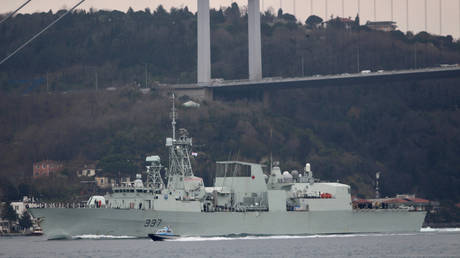
Two Canadian frontline naval ships lost storage devices containing top-secret information, including electronic warfare data, over the past two years, a CBC investigation has revealed.
Citing internal security assessments, the public broadcaster reported on Thursday that USB sticks, DVDs, and a backup hard drive had all gone missing from the vessels, despite an apparent tightening of security measures following a high-profile espionage scandal nearly a decade ago.
The first incident took place in August 2020, and involved data about the HMCS Fredericton. That frigate is reportedly deployed in support of NATO’s ‘Operation Reassurance’ in Eastern Europe.
According to CBC, searches failed to turn up two missing DVDs that contained highly “sensitive” information – including data on threat emitters, which are electronic devices used by the ship’s systems to identify and help counter incoming missiles.
“The possibility of uncontrolled disclosure cannot be ruled out, however it does not appear inappropriate disclosure took place,” an assessment said. An internal investigation concluded the loss of data had the potential to severely affect the national interest, CBC reported.
Earlier this year, a hard drive used to store secret high-frequency messages during NATO operations was discovered to be lost after a routine security audit of the HMCS Montreal. The Department of National Defence (DND) confirmed the breach to the outlet, which noted that two USB sticks also went missing from the frigate’s security safe during the incident.
The DND claimed to have later recovered the USBs – one of which is understood to have contained technical manuals about an unspecified weapons system. But the DND stated that the manuals were old.
The materials were missing for over six weeks following the mid-October breach, which prompted a military police probe. But an unnamed DND spokesperson told CBC on Tuesday that the hard drive was recently found in the vessel’s secure emergency radio room. The outlet noted that there has been no explanation as to how it turned up in such an “obvious location.”
Although the lapse was attributed to poor accounting, Canada’s armed forces chief General Wayne Eyre told CBC News in a recent interview that he was concerned by both incidents and said the military must become “much more security conscious.”




